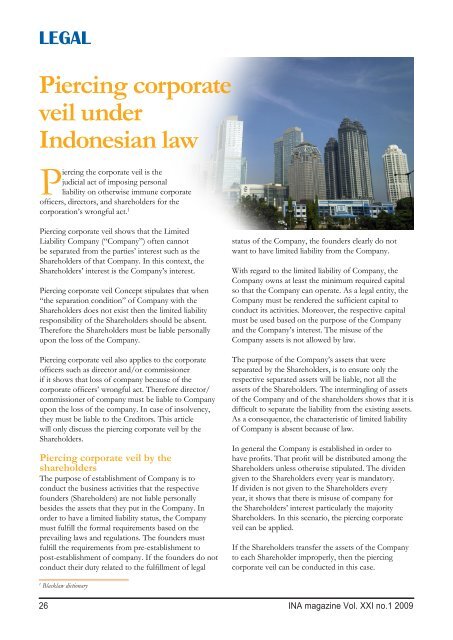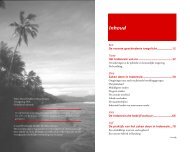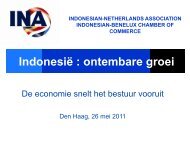Piercing corporate veil under Indonesian law
Piercing corporate veil under Indonesian law
Piercing corporate veil under Indonesian law
Create successful ePaper yourself
Turn your PDF publications into a flip-book with our unique Google optimized e-Paper software.
LEGAL<br />
<strong>Piercing</strong> <strong>corporate</strong><br />
<strong>veil</strong> <strong>under</strong><br />
<strong>Indonesian</strong> <strong>law</strong><br />
<strong>Piercing</strong> the <strong>corporate</strong> <strong>veil</strong> is the<br />
judicial act of imposing personal<br />
liability on otherwise immune <strong>corporate</strong><br />
officers, directors, and shareholders for the<br />
corporation’s wrongful act. 1<br />
<strong>Piercing</strong> <strong>corporate</strong> <strong>veil</strong> shows that the Limited<br />
Liability Company (“Company”) often cannot<br />
be separated from the parties’ interest such as the<br />
Shareholders of that Company. In this context, the<br />
Shareholders’ interest is the Company’s interest.<br />
<strong>Piercing</strong> <strong>corporate</strong> <strong>veil</strong> Concept stipulates that when<br />
“the separation condition” of Company with the<br />
Shareholders does not exist then the limited liability<br />
responsibility of the Shareholders should be absent.<br />
Therefore the Shareholders must be liable personally<br />
upon the loss of the Company.<br />
<strong>Piercing</strong> <strong>corporate</strong> <strong>veil</strong> also applies to the <strong>corporate</strong><br />
officers such as director and/or commissioner<br />
if it shows that loss of company because of the<br />
<strong>corporate</strong> officers’ wrongful act. Therefore director/<br />
commissioner of company must be liable to Company<br />
upon the loss of the company. In case of insolvency,<br />
they must be liable to the Creditors. This article<br />
will only discuss the piercing <strong>corporate</strong> <strong>veil</strong> by the<br />
Shareholders.<br />
<strong>Piercing</strong> <strong>corporate</strong> <strong>veil</strong> by the<br />
shareholders<br />
The purpose of establishment of Company is to<br />
conduct the business activities that the respective<br />
fo<strong>under</strong>s (Shareholders) are not liable personally<br />
besides the assets that they put in the Company. In<br />
order to have a limited liability status, the Company<br />
must fulfill the formal requirements based on the<br />
prevailing <strong>law</strong>s and regulations. The fo<strong>under</strong>s must<br />
fulfill the requirements from pre-establishment to<br />
post-establishment of company. If the fo<strong>under</strong>s do not<br />
conduct their duty related to the fulfillment of legal<br />
1 Black<strong>law</strong> dictionary<br />
status of the Company, the fo<strong>under</strong>s clearly do not<br />
want to have limited liability from the Company.<br />
With regard to the limited liability of Company, the<br />
Company owns at least the minimum required capital<br />
so that the Company can operate. As a legal entity, the<br />
Company must be rendered the sufficient capital to<br />
conduct its activities. Moreover, the respective capital<br />
must be used based on the purpose of the Company<br />
and the Company’s interest. The misuse of the<br />
Company assets is not allowed by <strong>law</strong>.<br />
The purpose of the Company’s assets that were<br />
separated by the Shareholders, is to ensure only the<br />
respective separated assets will be liable, not all the<br />
assets of the Shareholders. The intermingling of assets<br />
of the Company and of the shareholders shows that it is<br />
difficult to separate the liability from the existing assets.<br />
As a consequence, the characteristic of limited liability<br />
of Company is absent because of <strong>law</strong>.<br />
In general the Company is established in order to<br />
have profits. That profit will be distributed among the<br />
Shareholders unless otherwise stipulated. The dividen<br />
given to the Shareholders every year is mandatory.<br />
If dividen is not given to the Shareholders every<br />
year, it shows that there is misuse of company for<br />
the Shareholders’ interest particularly the majority<br />
Shareholders. In this scenario, the piercing <strong>corporate</strong><br />
<strong>veil</strong> can be applied.<br />
If the Shareholders transfer the assets of the Company<br />
to each Shareholder improperly, then the piercing<br />
<strong>corporate</strong> <strong>veil</strong> can be conducted in this case.<br />
26 INA magazine Vol. XXI no.1 2009
LEGAL<br />
Theory of piercing <strong>corporate</strong> <strong>veil</strong><br />
With regard to the piercing <strong>corporate</strong> <strong>veil</strong>, there are five<br />
(5) theories e.g. agency, fraud, sham or façade, group<br />
enterprise and unfairness/justice.<br />
In the Agent theory, the Company is agent of the<br />
Shareholders. It shows that as an agent, the Company<br />
is not liable upon the acts that were conducted by<br />
itself based on the purpose of the Shareholders.<br />
Therefore there is no limited liability that applies to the<br />
Shareholders.<br />
In the Fraud theory, the particular action is conducted<br />
by the Company in order to avoid the personal liability.<br />
For example: the Shareholders treats the assets of the<br />
Company as their own personal assets, the respective<br />
Shareholders use the Company’s assets for his personal<br />
interest, and the Shareholders’ act emerges the transfer<br />
of Company’s assets to each Shareholders improperly.<br />
Furthermore, a ‘sham’ or façade will be applied as<br />
piercing the <strong>corporate</strong> <strong>veil</strong> if the <strong>corporate</strong> form was<br />
in<strong>corporate</strong>d or used as a mask to hide the real purpose<br />
of the <strong>corporate</strong> controller. While a façade will be used<br />
as a category of illusory reference to express the court’s<br />
disapproval of the use of the <strong>corporate</strong> form to evade<br />
obligations, although the court has failed to identify<br />
clear test based on pragmatic consideration such as<br />
<strong>under</strong>capitalization or domination. 2 The purpose of<br />
the Shareholders to establish a company is only to avoid<br />
the limited liability; however they do not fulfill their<br />
obligations. For example: the intermingling of assets of<br />
the Company and Shareholder.<br />
Furthermore, the group enterprises theory will be<br />
applied as piercing the <strong>corporate</strong> <strong>veil</strong> because a<br />
<strong>corporate</strong> group is operating in such a manner as to<br />
make each individual entity indistinguishable, and<br />
therefore it is proper to pierce the <strong>corporate</strong> <strong>veil</strong> to<br />
treat the parent company as liable for the acts of the<br />
subsidiary.<br />
For example : the Board of Director (“BoD”) can not<br />
take any action without considering the regulations of<br />
Parent Company with regard to the Company. In this<br />
case, BoD will take action only for the interest of the<br />
Parent Company as the Company’s shareholders.<br />
The Shareholder in a Company may also seek to pierce<br />
<strong>corporate</strong> <strong>veil</strong> to get the <strong>under</strong>lying reality of the<br />
situation, in order to avoid an unfair outcome. In that<br />
2 Widjaja,Gunawan, Risiko Hukum sebagai Direksi, Komisaris & Pemilik PT, Forum Sahabat, 2008<br />
3 Art.3(1) Law No. 40 of 2007 regarding Limited Liability Company (August 17, 2007) (“Law 40/07”)<br />
In the Fraud theory, the particular action is conducted by the Company in order<br />
to avoid the personal liability<br />
condition, the unfairness/justice theory can be applied<br />
for the piercing <strong>corporate</strong> <strong>veil</strong>.<br />
For example : The majority shareholder also involves<br />
in making decision for the Company. Because of his<br />
respective action, the party that has legal relationship<br />
with the Company gets unfair outcome. If the<br />
respective party files a suit against the Company, his<br />
claim to Company will make the Company’s loss bigger.<br />
In this case, it would make it possible for the direct<br />
claim to the majority of shareholders to be made.<br />
<strong>Piercing</strong> the <strong>corporate</strong> <strong>veil</strong> based on<br />
<strong>Indonesian</strong> company <strong>law</strong><br />
Company Shareholders are not personally liable for<br />
agreements entered into on behalf of the Company<br />
and are not liable for Company losses exceeding the<br />
nominal value of the shares individually subscribed. 3<br />
The condition above will not apply if :<br />
1. The requirements for [a Company’s existence as]a<br />
legal entity have not been or are not fulfilled ;<br />
INA magazine Vol. XXI no.1 2009 27
LEGAL<br />
2. Shareholder, either directly or indirectly, in bad faith,<br />
uses the Company solely for personal purposes ;<br />
3. A shareholder is involved in un<strong>law</strong>ful acts committed<br />
by the Company; or<br />
4. A shareholder, either directly or indirectly, un<strong>law</strong>fully<br />
uses the Company’s assets, which causes the<br />
Company assets to be inadequate to settle the<br />
Company’s debts.<br />
Point (1),<br />
it is clear that the Shareholders are not serious to obtain<br />
the status of limited liability. This status can only be<br />
obtained after the Company has gained the Ministry<br />
of Laws and Human Rights (“MoLHR”) approval. 4 If<br />
the Shareholders neglect the formal procedure of the<br />
establishment of the Company, it can be interpreted<br />
that the Shareholders do not really want to establish a<br />
limited liability company.<br />
The request to obtain MoLHR legalization must be<br />
submitted to the Ministry at the latest of 60 (sixty) days<br />
after the Deed of Establishment (“DoE”) is signed,<br />
together with the information about the supporting<br />
documents.<br />
If the request to obtain the Ministry’s legalization is not<br />
submitted within this period, the Article of Association<br />
4 Art.10 (1) Law 40/07<br />
becomes void as from the passage of that period<br />
and the Company that has not obtained the legal<br />
entity status is dissolved by <strong>law</strong> and its settlement<br />
shall be carried out by the fo<strong>under</strong>s.<br />
The Company cannot obtain the legal status not<br />
only because the Company has no MoLHR’s<br />
approval but also for other reasons such as the<br />
fo<strong>under</strong>s have not placed the capital as agreed<br />
before, fo<strong>under</strong>s do not give their authority<br />
to the Company’s officers to conduct the<br />
Company’s activities because the fo<strong>under</strong>s wishto<br />
conduct activities on behalf of the Company, etc.<br />
Point (2),<br />
The Shareholders in bad faith uses the<br />
Company for their own interest. The Company<br />
implements only the purposes and objectives of<br />
the Shareholders. This is in line with the Agent<br />
Theory. Therefore, the Shareholders in bad faith<br />
can not be protected by <strong>law</strong>. <strong>Piercing</strong> Corporate<br />
Veil can be applied in this case.<br />
Point (3),<br />
Shows that a shareholder is involved in un<strong>law</strong>ful acts<br />
committed by the Company based on the Fraud theory.<br />
Anyone who causes loss to others, must be liable upon<br />
that loss. As an artificial person, the Company does<br />
not have objectives. In the event that the objective<br />
of Company is the same as the Shareholders’, the<br />
Shareholders will become liable.<br />
Point (4),<br />
Related to the use of the Company’s assets illegally, in<br />
the event the Shareholders use the Company’s assets<br />
and losses exceeding the Company’s assets, which cause<br />
the Company can not settle its debts to Creditors, then<br />
the piercing <strong>corporate</strong> <strong>veil</strong> can apply to this case.<br />
Parties that are being protected by the<br />
principle of the piercing of <strong>corporate</strong> <strong>veil</strong><br />
Article 3 (2) Law 40/07 does not explain explicitly<br />
the parties that are being protected by the Principle of<br />
the <strong>Piercing</strong> of Corporate Veil. However, Article 3 (2)<br />
Law 40/07 may give protection to the Creditors of the<br />
Company.<br />
Moreover, Article 61 and Article 62 Law 40/07 may<br />
give protection to the Minority Shareholders. Article 61<br />
and 62 Law 40/07 stipulate the followings :<br />
1. Each shareholder is entitled to file a <strong>law</strong>suit against<br />
28 INA magazine Vol. XXI no.1 2009
LEGAL<br />
the Company in the District Court, if [that<br />
Shareholder] suffers losses by the Company’s actions<br />
which are considered unfair and without reasonable<br />
ground as a result of a resolution of the General<br />
Meeting of Shareholders (“GMS”), BoD and/or<br />
Board of Commissioners (“BoC”). The <strong>law</strong>suit shall<br />
be filled in the District Court whose jurisdiction<br />
covers the Company’s seat.<br />
2. Each shareholder is entitled to demand the Company<br />
to purchase his shares at a reasonable price, if that<br />
shareholders does not approve of the Company’s<br />
action which is detrimental to the shareholder or the<br />
Company, namely :<br />
a. An amendment to the Article of Association ;<br />
b. A transfer, or a change of the Company’s assets<br />
that have a value of more than 50% (fifty<br />
percents) of the Company’s net assets ; or<br />
c. A Merger, a Consolidation, an Acquisition or a<br />
Separation.<br />
Where the shares requested to be purchased in the<br />
abovementioned condition exceed the limit for<br />
the provision regarding share repurchase by a<br />
Company, the Company must make an effort<br />
that the remaining shares be purchased by a<br />
third party.<br />
Those Articles show that the Shareholders<br />
only have rights to sue the Company, if the<br />
respective actions/or acts of the Company are<br />
taken based on the prevailing mechanism, and/<br />
or have been ratified by the Company based on<br />
the prevailing <strong>law</strong>s and regulations.<br />
Case example :<br />
We may see the Bank Summa’s case in 1992<br />
when Mr. Edward Soeryadjaya as a shareholder<br />
as well as the Corporate officer of Summa<br />
Bank must responsible for the Summa Bank’s<br />
debts.<br />
Summa Bank had loss and could not pay its<br />
debts to its creditor. Mr.Edward’s father, Mr.<br />
William Soeryadjaya (“Om William”) acted as<br />
a personal guarantor of Summa Bank. Bank<br />
Indonesia gave warnings to Bank Summa<br />
because they could not fulfill their obligation.<br />
Bank of Indonesia has stipulated the period<br />
time for Bank Summa to pay its debts. When<br />
the time was lapsed, Mr. Edward Soeryadjaya<br />
could not pay its debts. Because of this, Om<br />
William had to sell his shares in PT Astra<br />
International to pay Summa Bank’s debts that managed<br />
by his son. In this case, the Shareholders may loss its<br />
immunity upon the limited liability subsequently the<br />
Shareholder will be personally liable.<br />
Also the limited liability principle may be absent when<br />
the Corporate Officers (“Board of Directors or Board<br />
of Commissioners”) are at fault or negligent in carrying<br />
out their duties according to the principle of good faith<br />
(Article 97 (3) Law 40/07).<br />
For more information and other legal matters, please contact<br />
Ms. Mary Osmond at <strong>law</strong>@ina.or.id<br />
or<br />
Mr. Muqthi Ali at cic@fcgi.or.id<br />
INA magazine Vol. XXI no.1 2009 29




